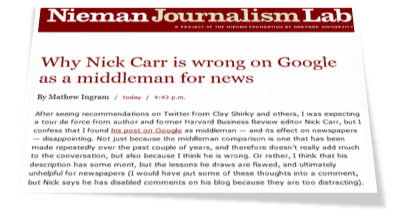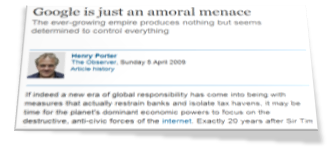Newspapers need to stop obsessing about Google

Matthew Ingram correctly criticizes Nick Carr’s post on Google as a middleman, but unfortunately does so from highly specious grounds. Mr. Carr conceptualizes Google as a new middleman in the news industry, and uses some elementary game theory to explain why newspapers don’t ‘opt-out’ of Google’s index. Essentially, it’s cooperate or die – the same charge Henry Porter levels at Google with a great deal more venom.
Mr. Ingram disagrees that (i) Google is a new middleman, and (ii) Google is demolishing the traditional business model of newspapers.
Does this perception of Google as middleman, stealing traffic and eyeballs from newspapers, really hold water? I don’t think so — and Nick doesn’t provide any real evidence to the contrary. After all, if you search for news about something, Google doesn’t show you anything but a bunch of headlines and excerpts from stories at newspaper websites. How can that simple act be seen as demolishing the business model of newspapers? As far as I’m concerned, if your headline and lede paragraph are the sum total of the value you are providing for readers, then you deserve to lose your business to Google.
Unfortunately, Mr. Ingram somewhat misses the point. While he is correct in saying that Mr. Carr offers no evidence that Google is a middleman, stating that Google “doesn’t shot you anything but a bunch of headlines and excerpts” doesn’t disprove it. In fact, that is precisely what a middleman would do – connect potential readers to the source material. Instead, the determination of Google as a middleman would have more to do with its popularity: how much newspaper traffic comes from Google? If newspaper are dependent on Google for traffic, then Google is a “middleman” for those sites. Google may not be a middleman for all sites, or even the entire newspaper industry; but as soon as the percent of traffic a newspaper site receives from Google reaches some critical mass, Google has “middleman power”. This is particularly true these days as Google’s market share of the search industry is well into ‘monopoly range’ (over 70%), giving Google considerably market power.
Regardless, Mr. Ingram hits the nail on the head when he says that “trying to artificially re-create the kind of scarcity that papers used to enjoy — something that was a function of the control they had over a distribution mechanism, more than anything else — is a mug’s game”.
The problem is that newspapers – each individual firm – is a market-efficient solution to the problem of news creation, aggregation, publication, and distribution before the internet. However, as I’ve pointed out previously, the cost of news publication and distribution has dropped to zero. Furthermore, the creation of middlemen like Google dramatically lowers any barriers to entry, as well as eliminating the “local” nature of news. With the internet, local news is treated no differently than national news (i.e. it’s treated the same way). These two factors implies that (i) we will see the destruction of local newspapers, and (ii) the number of news-creating agents (journalists, small specialized firms) will dramatically increase. We can see the latter with the creation of “blog networks”, which have received considerable funding and in some cases established a monopoly over their niche (e.g. TechCrunch).
As basic economic theory implies, the dramatic increase in competition lowers profits. This is not helped by the simultaneous creation of companies like Craigslist which competes with the formerly highly profitable listings sections of local newspapers, and the injection of middlemen like Google – who, as Nick Carr points out, steal some of the revenue (the advertising pie is finite).
So it’s no surprise that newspapers are struggling; the market has changed, and now newspapers have to live within the new framework. Which means Mr. Ingram’s core point – that “newspapers should spend less time trying to disempower the middleman known as Google, and more time trying to think of ways to add value to what they do” – is correct. But that’s isn’t news. It’s always been about delivering profitable value.
